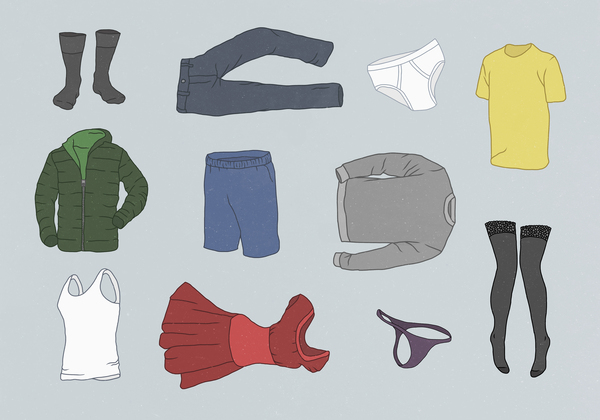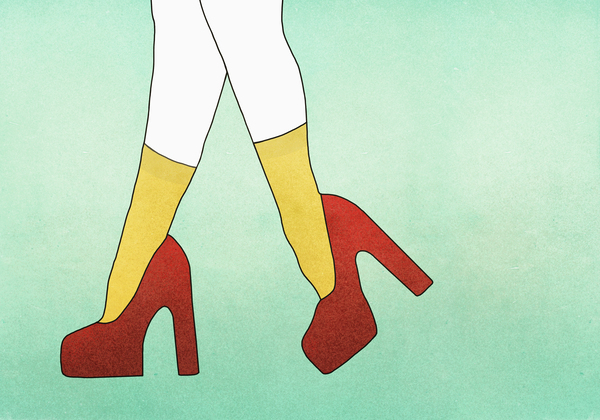
As people who work from home return to the office, they are wondering what to wear.
Malte Muller/Getty Images
In 1999, luxury clothing designer Tom Ford made a prediction about how technology could influence the way people dress in the not too near future.
“Life is changing. And we’re working more and more from home, more and more from our computer screen, which in the future, I mean, there are a number of ways this could happen,” she said in an interview with Charlie Rose. “A lot of people think fashion could die just because we’re home. You can be working in your underwear and a T-shirt. Who cares? Who’s going to see you?”
Did your prediction become your reality during the COVID-19 pandemic? If so, you are not alone.
As many people worked from home during the pandemic lockdown, formal company dress codes dissolved and office workers no longer needed to dress up. The pants were replaced by sweatshirts. People ditched heels. And the shirts began to dominate.
Now that many of those workers are returning to the office, it seems that we are entering a new era of workwear. This has raised the question: What should I wear to work?
As part of NPR’s Work Life series, NPR’s Morning Edition spoke with people who are navigating that question. They include Jeremy Gonzalez, 27, who started working on Capitol Hill last November.
“When I first started going, even on recess days, I would wear a suit and tie or even my three-piece suit,” he said. But after waves of pandemic variants and a fluctuating hybrid schedule, he’s now more inclined to wear jeans and a button-up or polo shirt.
Some others in politics are also dressing up remarkably.
When the leaders of the Group of Seven countries took a group photo in Germany last month, something peculiar happened: they all took off their ties. It was believed to be the first time in 40 years that a G-7 portrait had been taken without a tie and could be seen as another sign that formal dress codes are becoming more relaxed.

Leaders of the Group of Seven pose at the G7 summit at Castle Elmau in Kruen, near Garmisch-Partenkirchen, Germany, on June 26. Conspicuously missing from the group photo: ties.
Markus Schreiber/AP
More flexible dress codes have made their way into another notoriously formal work culture, Wall Street, where for men, suits have traditionally been the only option.
Now “the key word is confusion,” says Ken Giddon, whose family runs Rothman’s, a men’s store in Manhattan. “People really don’t know what to do.”
With offices reopening, she has noticed that people are less sure what to wear.
“Do you wear dress pants to work? Do you wear khakis? Can you wear jeans?” he said. “No one has really drawn the line, and no one really knows what the correct answer is.”

The pandemic gave some people the freedom to trade in their heels for something more comfortable.
Malte Muller/Getty Images
His advice is to start with dress pants and a blazer, assess the office environment, and go from there.
Mademoiselleosaki’s top critic, Robin Givhan, agrees: err on the more elegant side.
“What I’ve noticed is that there really is a return to fashion with a capital F,” he said. “I think people who loved it before still love it. And there’s something about creating boundaries again. You have the clothes that you wear in the world and then you have the clothes that are your play clothes, your lounge clothes.”
Still, Givhan sees an area where comfort will remain a priority.
“I don’t see a return to serious, dressy heels or tight shoes,” Givhan said. “I see a lot more floors both in offices and on catwalks.”
Of course, not everyone likes to dress in formal clothes. And, as Givhan says, not everyone wants the same kind of break between their personal and professional selves.
“I think for some people it’s really invigorating to be able to bring the whole of their personality wherever they go,” he said. “And I think there are other people who were frustrated by the fact that their workday never seemed to end, that it just turned into a giant mix of being constantly online.”
Just as Tom Ford predicted.
Jeevika Verma produced the radio version of this story and Rachel Treisman edited and produced the web version.
Copyright 2022 NPR. To see more, visit https://www.npr.org.
Source: www.mprnews.org